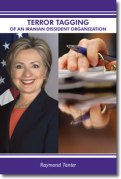 CLICK HERE FOR ORIGINAL PRESS RELEASE ON THE INTERNET.
CLICK HERE FOR ORIGINAL PRESS RELEASE ON THE INTERNET.
WASHINGTON, February 19, 2012, A humanitarian tragedy unfolds as the Iraqi military and police harass and threaten 397 Iranian dissidents relocated to Camp Hurriya, a former American military base [as shown in image on the left]. They are the first of 3,400 residents of Camp Ashraf. How Iraq, UN, EU, and the United States act is a litmus test for whether the rest of the residents of Camp Ashraf relocate.
Professor Raymond Tanter, former member of the National Security Council staff in the Reagan-Bush White House and President of the Iran Policy Committee, stated, “The UN shares with Washington responsibility to protect Iranian dissidents from being harmed by Iraqi authorities. At the UN World Summit, September 2005, over 150 countries adopted ‘responsibility to protect’ populations from genocide, war crimes, ethnic cleansing, and crimes against humanity.”
Professor Tanter said, “The United High Commissioner for Refugees (UNHCR) formally recognized on 13 September 2011, and reiterated on 1 February 2012 residents of Ashraf as “asylum seekers,” with rights and protections based on international humanitarian standards. According UNHCR, “International law requires that asylum-seekers must be able to benefit from basic protection of their security and well being. This includes protection against any expulsion or return to the frontiers of territories where their lives or freedom would be threatened.”
Professor Tanter added, “But the United Nations Assistance Mission for Iraq (UNAMI) works at cross purposes with UNHCR. While UNHCR stands ready to conduct Refugee Status Determination to resettle the dissidents in other countries, UNAMI colludes with Iraqi authorities, providing a pretext for Baghdad to harm them, contrary to international humanitarian standards.
UNHCR emphasizes protecting Iranian dissidents stating, “Any relocation outside Camp New Iraq [Ashraf] [should] proceed on a voluntary basis, with freedom of movement the most desirable state at the site of relocation.” But according to reports, Iranian dissidents are barred from taking their personal belongings, even items like wheelchairs, microwave ovens, and satellite dishes for Internet access. Contrary to UNHCR, the dissidents have no freedom of movement. Journalists are kept away, and neither lawyers nor families can observe or visit Camp Hurriya; in disregard of dissidents’ rights, UNAMI paid no attention to Iraqi harassment, intimidation, and insult to them upon arrival to Hurriya.
Washington is also accountable for failure to provide effective diplomatic pressure on Iraq to ensure safe relocation, often called the “American plan” because it stems from a Christmas Day statement by Secretary of State Hillary Clinton: “We are encouraged by the Iraqi government’s willingness to commit to this plan, and expect it to fulfill all its responsibilities, especially [to] provide for the safety and security of Ashraf’s residents.”
Because of the Clinton statement, the dissidents accepted the relocation plan, which is now being violated by Iraqi authorities. A subsequent announcement by the Department of State “commends the decision by the Ashraf residents to begin to relocate to Hurriya, where the United Nations will begin a process aimed at facilitating their eventual departure from Iraq,” a commendation that enhances U.S. stake in the plan and responsibility to protect the dissidents. By praising the former residents of Ashraf for the first time, the pronouncement also implicitly commends their leadership in Paris for its constructive role in averting human tragedy.
The Way Forward
In a statement of 7 February this year, 23 former senior officials of the U.S. Government expressed concern about relocation, “We are very troubled by the official position of the Iraqi Government that the residents of Ashraf will have no freedom of movement while in Camp Liberty.”
First, the IPC concurs with a recommendation of our former colleagues in the U.S. Government for American Embassy Baghdad to obtain assurances for security of dissidents now relocated in Camp Hurriya and as incentive for the 3,000 who remain in Camp Ashraf to relocate: “We believe an operational protocol must be developed through dialogue among all relevant parties, including the representatives of Camp Ashraf and the Iraqi Government.”
Second, the UN might inform dissidents of rights as asylum seekers. The IPC is dismayed to learn that Iranian dissidents in Camp Hurriya have no minimum assurances from either the UN or Washington about their security or rights under international human rights law.
Third, the Secretary General needs to bring operational practices of UNAMI in accord with humanitarian standards of asylum seeker status provided by UNHCR. If the Iraqi police were outside Camp Hurriya and UNAMI monitors inside, UNHCR humanitarian standards are more likely to be followed.
Without such steps, a calamity is likely, spilled blood of the Iranian asylum seekers will be on the hands of those with responsibility to protect, and appropriate legal action against accountable parties is likely in international and national tribunals.
###



